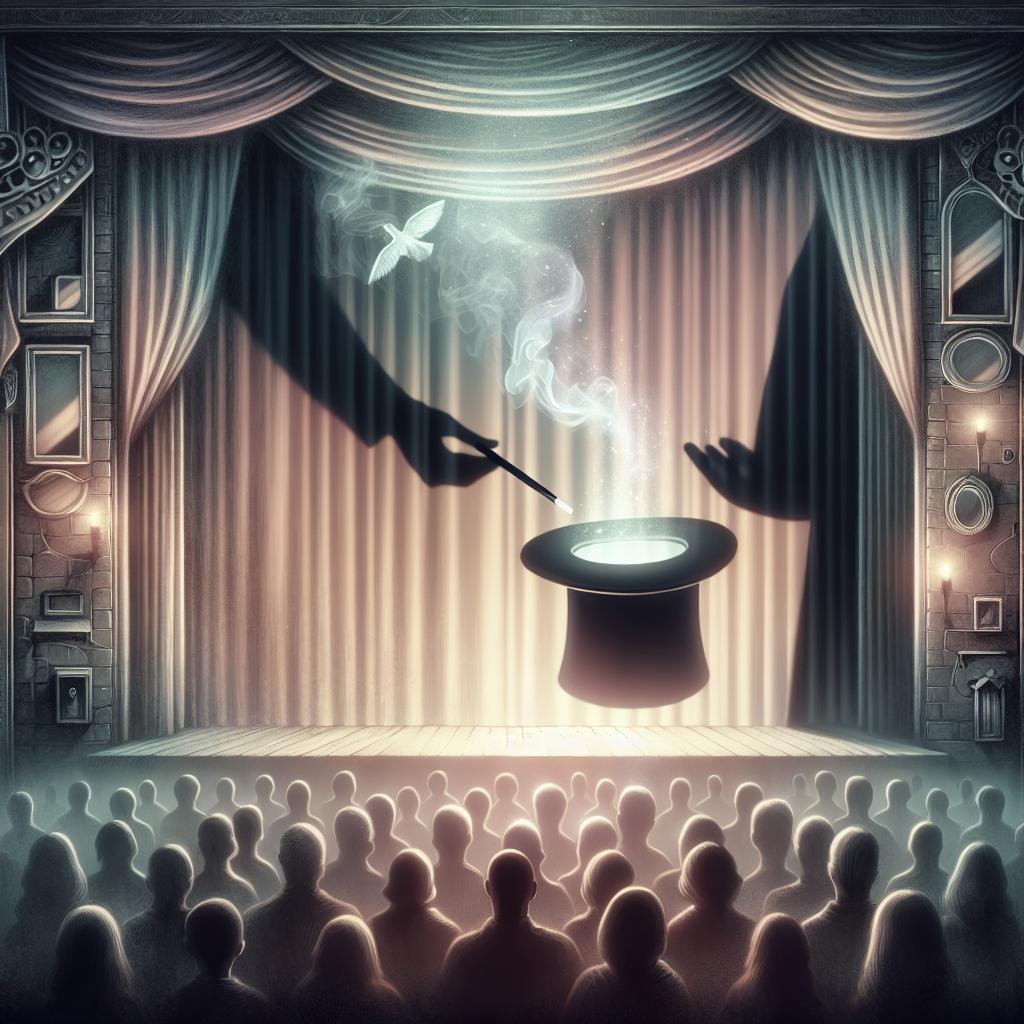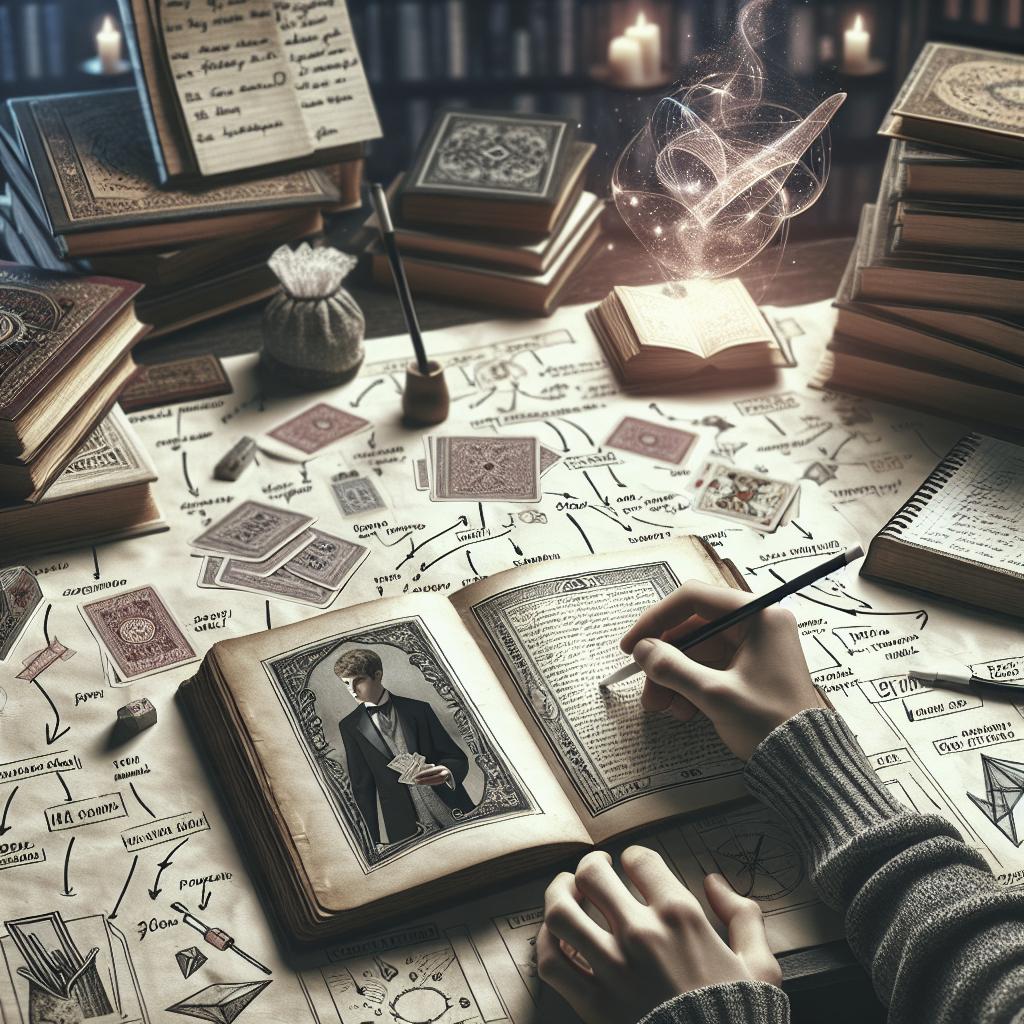“`html
Maintaining Mystery in Magic Acts
Magic is an age-old art that captivates and fascinates audiences everywhere. But what exactly is it about magic performances that keep us on the edge of our seats? This comprehensive guide explores the enchanting world of magic by answering common questions about its diverse practitioners, their techniques, and the science behind the allure of this ancient art. From learning the differences between magicians, illusionists, and mentalists to understanding the real vs. trickery in magic, dive into the mysteries of magic acts, the history of this mesmerizing craft, and the reasons behind keeping its secrets close. Explore why magicians use animals, the significance of cards in their acts, and much more. By the end of this guide, you’ll appreciate the art of maintaining mystery even more.
Unlocking the Magic: 21 Fascinating Questions About Magicians Answered
The allure of magic slightly unwinds when we attempt to comprehend its subtleties. These questions and their intriguing answers shed light on what lies behind the curtain of illusion.
In understanding magic, it becomes apparent that magicians are custodians of a rich history of practice and precision. While the spellbinding nature of their acts remains, unraveling these questions offers a glimpse into the fascinating world of magic.
Is Magic Real? Are magicians real or tricks?
Magic, in its traditional sense, involves the inexplicable and the supernatural. Yet, when it comes to magic acts, magicians employ skillful manipulations that often lead audiences to believe in the impossible.
In essence, magicians are performers who create an illusion of reality through well-crafted techniques, sleight of hand, and psychological tricks. Their work revolves around mastering deception rather than accessing any supernatural powers.
Difference between Magicians and Illusionists
Magicians and illusionists may appear synonymous; however, their performances differ i great detail. Magicians often focus on smaller, close-up tricks involving cards, coins, or personal items, emphasizing sleight-of-hand.
Illusionists, conversely, are known for grand-scale performances designed for larger audiences. Their acts include stage illusions that often require elaborate setups, equipment, and choreography.
What are the Differences Between a Magic Trick & Illusion?
4 Differences Between a Magic Trick and a Stage Illusion:
1. Scale: Magic tricks are typically small-scale and performed close-up, while illusions are often grand and staged for large audiences.
2. Equipment: Tricks require minimal props, whereas illusions involve extensive stage setups and devices.
3. Technique: Tricks heavily rely on sleight of hand, and illusions depend on crafted scenarios and misdirection techniques.
4. Impact: Tricks surprise through subtlety and skill, whereas illusions amaze with their dramatic presentation and spectacle.
What Are The Different Types of Magicians?
What is a Magician?
A magician is a performer specializing in sleight-of-hand tricks and is known for creating mystical and fantastic experiences for audiences. They master magic tricks using various forms, such as stage magic, close-up magic, and parlor magic.
Magicians often possess the unique ability to blend entertainment with deception, crafting an immersive and interactive experience that invites audiences to suspend their disbelief.
What is a Mentalist?
Mentalists are magicians who focus on mind tricks. Their acts involve telepathy, mind control, and psychological manipulation techniques to create a reality-bending narrative that feels authentic to the audience.
The mentalist’s performance hinges on their understanding of human psychology, often creating experiences that suggest they can influence or predict spectators’ behaviors and thoughts.
What is an Illusionist?
An illusionist is a magician specializing in large-scale illusions. Their acts involve a high level of showmanship, using grand illusions with theatrical and flamboyant setups to entertain audiences.
Illusionists often scale their acts for more extensive settings, focusing on fabricating realities through grand tricks that employ puzzles and visual dynamics on a grand stage.
What is an Escape Artist?
Escape artists are magicians specializing in feats of escaping from confinement. Their acts involve breaking free from shackles, locked boxes, or even more hazardous situations.
They combine elements of escapology with suspense, drawing audiences into the performance’s dangers and the miraculous escape’s inevitability.
Do Magicians Use Real Doves
The use of doves in magic is a staple trick known for its visual appeal and elegance. Yes, many magicians employ real doves to lend authenticity to their acts.
These live performances require careful handling and training of the birds, ensuring their well-being while enhancing the illusion’s charm and grace.
Do Magicians Kill Birds?
Where did the killing bird rumor start?
The myth of magicians killing birds likely stems from misunderstandings and misconceptions regarding traditional tricks and illusions. Historically, some acts may have involved unethical practices.
However, contemporary magicians prioritize animal welfare and typically arrange for humane treatment of animals involved in their tricks. The reputation of ethical handlers and improved awareness seeks to dispel this outdated perception.
Do Magicians Wear Capes?
The stereotypical image of magicians wearing capes often arises from historical depictions and theatrical traditions. While some do, wearing capes is not obligatory or requisite for all performers.
Contemporary magicians may choose to wear a variety of costumes based on personal style and the nature of their performance. The cape remains a symbol largely associated with the mystique of a traditional magician.
Why Do Magicians Use Rabbits
Rabbits have become synonymous with magic tricks, adding a whimsical, enchanting element to performances. Their size and docile nature make them ideal candidates for classic tricks such as pulling a rabbit out of a hat.
This iconic magic trick elevates a magician’s mystique, cementing the rabbit as an indispensable part of magic lore and prized for its gentle, approachable appearance.
Who was the first magician to pull a rabbit out of a hat?
The act of pulling a rabbit out of a hat is attributed to magician Louis Apollinaire Christian Emmanuel Comte, who first performed this in the early 19th century. This now-iconic act has been a mainstay in magic repertoires ever since.
Comte’s innovative act captured audiences’ imaginations and established a foundation for modern magic incorporating live animals into performances.
Are magicians and wizards the same?
Despite populating fantastical worlds, magicians and wizards distinguish themselves in reality through remarkable differences. Wizards typically occupy literature and folklore, presenting themselves as mythical figures with magical abilities and supernatural powers.
Magicians, on the other hand, are performing artists who use tricks and clever techniques to present illusions, creating a captivating experience grounded in art rather than myth.
Are Magicians Allowed in Casinos?
Magicians are allowed to perform in casinos, contributing to the unique entertainment experiences these establishments offer. Casinos often feature talented magicians as part of their diverse entertainment lineup.
While magicians bring charm and allure to the casino setting, they do not participate in gambling games as their sleight of hand could be perceived as an unfair advantage.
Are Magicians Liars?
While magicians rely on deception, their intent is not to deceive maliciously; rather, they aim to amuse and entertain. Magicians craft a narrative that invites the audience to engage in the wonder of disbelief.
The essence of magic is in mystery and creating awe-inspiring experiences, where the moment of revelation becomes an integral part of the entertainment rather than a literal truth.
How Do Magicians Become Magicians?
Becoming a magician involves dedication to mastering techniques, practicing endlessly, and cultivating charisma. It often begins with a fascination with the art form, leading to self-education and eventually seeking formal instruction or mentorship.
Magicians refine their skills through practice, learning performances, crowd interaction, and continuously innovating their acts. Regular performance is key to achieving proficiency in this art form.
Can magicians read minds?
While mind reading is a popular trope in magic acts, magicians do not possess the actual ability to read minds. Instead, they employ psychological tricks, body language reading, and suggestion techniques to create an illusion of telepathy.
The art of a convincing mentalist performance lies in understanding human behavior and manipulating subtle cues to create an impression of mind reading.
Can magicians really levitate?
Though magicians’ levitation acts appear astonishingly real, they rely on principles of illusion and mechanics rather than supernatural powers. Techniques involve cables, mirrors, or simply clever angles and choreography to create the illusion.
Levitation in magic is one of the most sought-after illusions, captivating audiences with its seamless appearance designed through intricate setup and execution.
Why do magicians say abracadabra?
“Abracadabra” has been associated with magic throughout history, believed to possess mystical powers. It has evolved into an integral component of magic lingo, signifying the moment of transformation or climax in a trick.
The phrase adds theatrical flair to performances, enhancing the magic’s mystique with tradition and identity unique to magicians.
Why do magicians never reveal secrets?
5 Reasons Magician’s Don’t Reveal Their Secrets
1. Preservation of Mystery: Revealing secrets dismantles the allure and wonder that envelop audiences during performances.
2. Professional Integrity: Magicians adhere to a code of ethics that emphasize keeping trade secrets private and protecting the craft.
3. Audience Experience: Maintaining secrecy ensures that the spectator’s experience remains magical and unexpected.
4. Respect for Artistry: Exposure of tricks undermines the intensive effort and creativity built into developing technical skills.
5. Inspiration to Innovate: Secrets stir curiosity, driving magicians and audiences to explore and appreciate new, inventive techniques.
Why Do Magicians Use Cards?
5 Reasons Magicians Use Playing Cards
1. Versatility: Cards offer endless combinations and routines, enhancing a magician’s creativity and engaging audiences.
2. Accessibility: Playing cards are ubiquitous and familiar tools, making them relatable and intriguing props for magic.
3. Portability: Easily transportable cards facilitate closer interactions, perfect for impromptu performances.
4. Skill Showcase: Cards allow magicians to demonstrate dexterity, complexity, and precision through intricate maneuvers.
5. Tradition: Cards hold historical significance in magic, celebrated and cherished across generations for their timeless allure.
Next Steps
| Topic | Highlights |
|---|---|
| Nature of Magic | Discussion of the real vs trickery in magic acts. Exploration of magician types and their specialized techniques. |
| Magic Tools | Investigation into the use of animals, capes, and cards in performances alongside the historical significance of tricks. |
| Managing Secrecy | Reasons behind the veil of secrecy magicians maintain and the ethics involved in the decision to keep tricks hidden. |
| Practicalities | Insights into magician lifestyles, how they hone their craft, and the physical implementations behind illusions like levitation. |
That’s It!
Whether you’re enchanted by the artistry of magic or eager to delve into its multifaceted world, the mystique of magicians remains a captivating tapestry woven from skill, history, and an insatiable human desire to be amazed.
What to Read Next:
If you found this guide intriguing, consider exploring deeper into the psychological aspects of magic or the evolution of illusion techniques. Recommendations include books and articles covering illustrious magicians’ biographies, the science behind tricks, and the cultural phenomenon that magic sustains today.
“`

